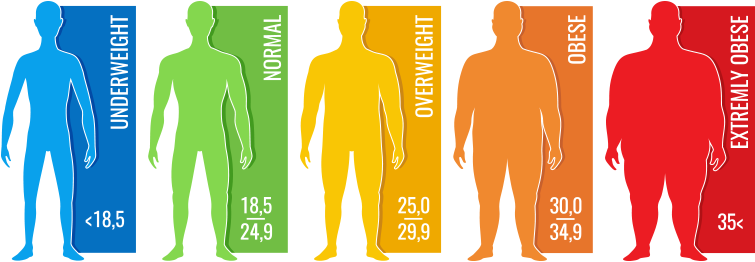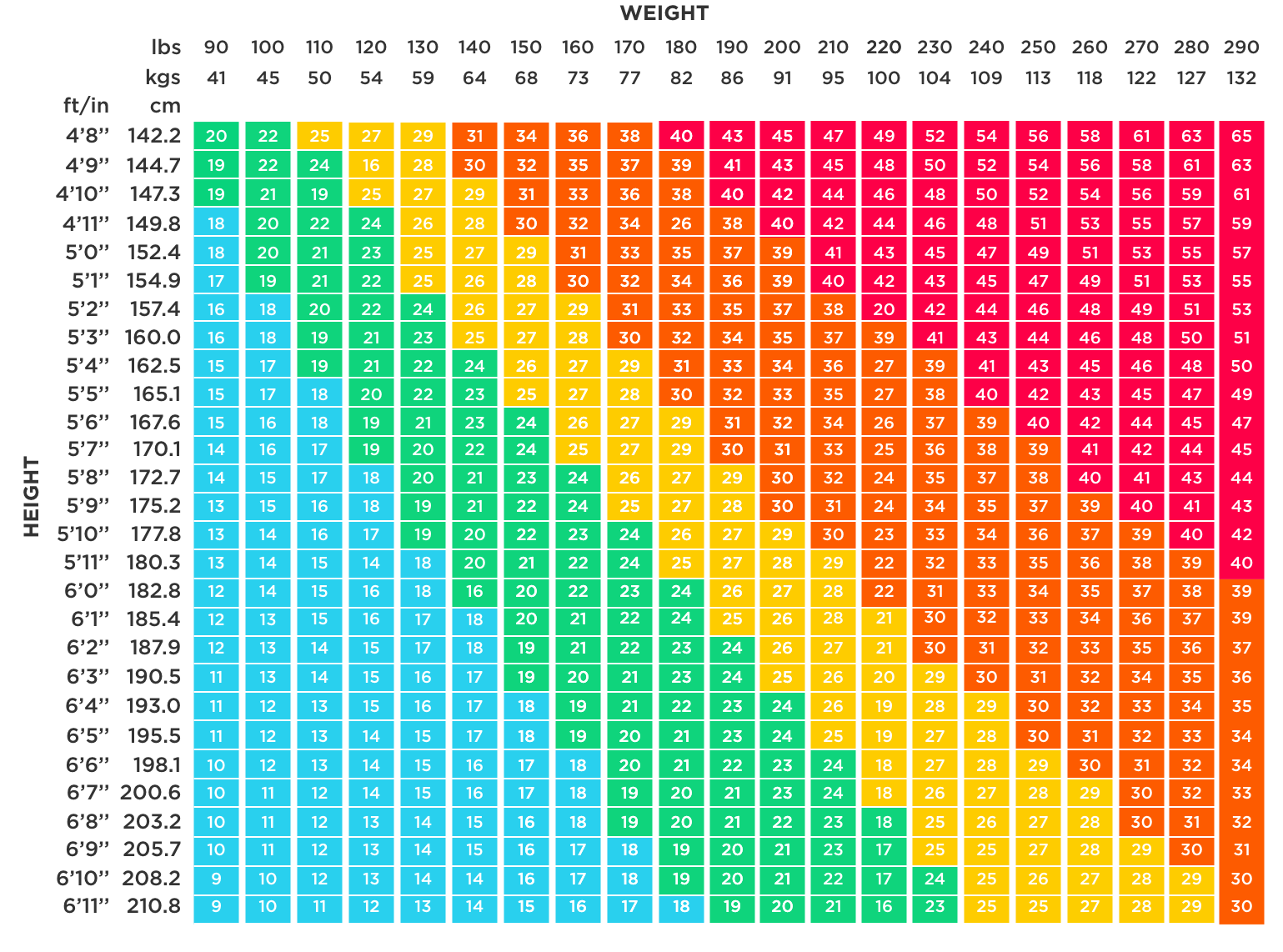What Is Body Mass Index (BMI)?
Body Mass Index (BMI) is a widely recognized method used to assess whether a person has a healthy weight in relation to their height, weight, age, and gender. Through the body mass index calculation, individuals can determine the level of fat in their body and make necessary lifestyle changes. If your BMI indicates that your weight is below or above the ideal range, you can take steps to either gain or lose weight accordingly. It is important to regularly calculate your BMI to monitor your physical health and make proactive changes.
BMI plays a crucial role in health management, helping us make informed decisions about our bodies. Maintaining a healthy BMI is key to preventing potential health risks such as obesity, cardiovascular diseases, and other weight-related conditions. By calculating your BMI, you can gain insights into your body’s ideal weight and take the necessary steps for long-term health benefits.
How To Calculate Body Mass Index?
Body mass index is calculated using basic body measurements and provides valuable insights into a person's health status. It helps to monitor health risks by keeping weight in check. BMI is calculated by dividing the body weight (kg) by the square of the height (m). For example, if a person weighs 65 kg and has a height of 1.74 meters, 1.74 is multiplied by itself (3.02), and then the weight (65) is divided by this value. The resulting BMI is 21.5. This method provides a quick and easy way to assess body fat levels.

Why Is Body Mass Index Important?
Calculating your BMI is an essential step in maintaining good health. BMI helps identify whether a person has a healthy weight, is overweight, or underweight. Although BMI may not directly reveal which diseases an individual is prone to, it serves as a vital tool in recognizing obesity risks. Early intervention can significantly reduce the likelihood of developing obesity-related health issues. Regularly tracking your BMI is crucial for understanding how your body changes over time and adjusting your lifestyle accordingly.
Does Body Mass Index Differ By Age?
Yes, BMI can vary with age. As individuals age, their metabolism tends to slow down, making it more challenging to maintain a healthy weight. Genetic factors also play a role in how BMI changes over time. For example, someone in their 20s may have a different BMI compared to when they are in their 50s, even if their lifestyle remains the same. The body mass index helps you understand what your ideal weight should be at various stages of life. Therefore, it’s essential to calculate your BMI regularly as you age to ensure you are within a healthy weight range.
Things To Consider When Calculating Body Mass Index
To get accurate results when calculating BMI, it’s important to use recent and correct measurements of your height and weight. BMI is an easy-to-use method that doesn’t require complex tools or criteria. However, the meaning of the result should not be ignored. If your BMI is higher than the healthy range, it is an indication that you may be at risk of weight-related health problems, and it’s advisable to seek medical advice from a health professional.
What Should Your Body Mass Index Be?
Body mass index values differ from person to person, but general guidelines can provide a useful benchmark. Here are typical BMI ranges based on age:
- 19-24 years: 19-24 BMI
- 25-34 years: 20-25 BMI
- 35-44 years: 21-26 BMI
- 45-54 years: 22-27 BMI
- 55-64 years: 23-28 BMI
- 65+ years: 24-29 BMI
If your BMI is outside these ranges, it is advisable to consult a healthcare provider. Additionally, you can use our site’s BMI calculator to determine your current BMI and monitor your progress.
How To Prevent Obesity As BMI Increases?
A high BMI is often an indicator of obesity or the risk of developing obesity-related conditions. Obesity can stem from various factors, including a sedentary lifestyle, poor diet, genetic predisposition, and stress. To prevent obesity, it is crucial to maintain an active lifestyle, manage stress, and adopt healthier eating habits. If your BMI is high, reducing portion sizes and incorporating physical activity into your daily routine can help bring your BMI to a healthier level.
What Is The Ideal Body Mass Index For Children?
For children, BMI is assessed using percentiles based on age and gender. If a child's BMI falls below the 5th percentile or is less than 18.5, they are considered underweight. Understanding a child’s BMI is vital in tracking their growth and development compared to peers. If your child's BMI is too low or too high, it’s important to seek advice from a pediatrician or dietitian.
How To Lower Body Mass Index?
To lower your BMI, it’s essential to manage weight gain and loss carefully. A balanced diet, regular exercise, and lifestyle adjustments are key to reducing BMI. If your BMI is higher than the normal range, focus on reducing calorie intake, avoiding high-fat and high-sugar foods, and incorporating regular physical activity such as walking, running, or cycling.
Understanding BMI Values
BMI values provide insight into an individual’s weight category. Here are the standard BMI classifications:
- Under 18.5: Underweight
- 18.5 – 24.9: Normal weight
- 25 – 29.9: Overweight
- 30 – 39.9: Obese
- 40 and above: Morbidly obese
If your BMI is outside the healthy range, it’s crucial to take immediate steps to improve your diet and physical activity levels to prevent further health complications.
What Is The Ideal Weight For Your Body?
Finding your ideal weight is easy once you calculate your BMI. The following categories can help determine your weight status:
- BMI under 19: Severely underweight
- 19-25 BMI: Normal weight
- 25-30 BMI: Slightly overweight
- 30-35 BMI: Obese
- 35+ BMI: Morbid obesity
Knowing your BMI allows you to set realistic weight goals and make informed decisions about your health. If you're unsure about your BMI or want to track changes over time, you can easily calculate your BMI on our website.

Is High Body Mass Index Dangerous?
If your BMI is within the healthy range, there’s no immediate need for concern. However, if you fall into the overweight or obese categories, it’s time to take action. Consult a dietitian, increase your physical activity, and adjust your diet to include more fruits and vegetables. Lowering your BMI can significantly reduce your risk of developing heart disease, hypertension, and other chronic conditions.
How Should People With High BMI Eat?
To bring your BMI to a healthier level, focus on these healthy habits:
- Adopt a balanced, nutritious diet
- Exercise regularly, 3-4 times per week
- Get enough sleep and rest
- Avoid sugary, processed foods
- Manage stress through relaxation techniques like meditation or yoga
Incorporating these changes will help lower your BMI and improve your overall well-being.
Little-Known Facts About BMI
While many people understand BMI as a basic measure of body fat, there are some lesser-known facts to consider. For instance, BMI doesn’t account for muscle mass, so athletes with high muscle density may have a higher BMI but are still healthy. Additionally, older adults should be more cautious with their BMI, as age-related changes can affect metabolism and body composition.
What Happens When You Lose Weight?
If you reduce your body fat percentage by losing weight, your BMI will also decrease. However, if you already have a low BMI, further weight loss can cause health issues such as low blood pressure and dizziness. Therefore, it’s important to consult your doctor to ensure you're losing weight in a healthy manner.
Why Should You Calculate Your BMI?
Calculating your BMI is essential for understanding your body’s current health status. It helps you determine whether you need to gain or lose weight. You can easily calculate your BMI on our website to track your progress over time and ensure you're within a healthy weight range.
When Are You Considered Obese?
If your BMI indicates that you have a high body fat ratio, you may be classified as obese. This can be a result of unhealthy eating habits, lack of exercise, and high-stress levels. It is important to regularly calculate your BMI to prevent obesity and take immediate steps if your BMI is over 40 for women or over 35 for men.
Factors Influencing BMI Calculation
Factors such as age, gender, height, and weight all play a role in determining your BMI. By inputting accurate information, you can get a reliable BMI result. Remember that while BMI is a useful health indicator, it should be considered alongside other measures such as blood tests and physical exams to get a comprehensive view of your health.
What Are The Benefits of Lowering Your BMI?
Lowering your BMI to a healthy range can reduce the risk of serious health problems such as heart disease, diabetes, and high blood pressure. By following a balanced diet, exercising regularly, and managing stress, you can improve your BMI and overall health. Use our BMI calculator to keep track of your progress and stay on the path to better health.
